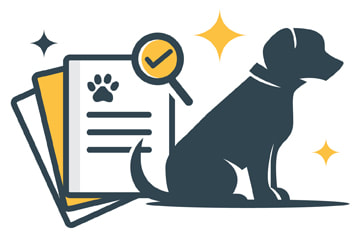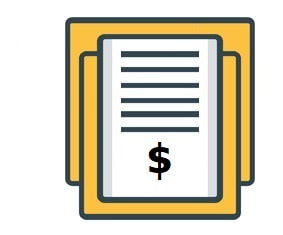The True Costs of Owning a Dog in New Zealand
Our guide explains the full recurring and non-recurring costs of dog ownership. We also walk through the top facts you need to know and the most frequently asked questions New Zealanders have regarding dog costs.
Updated 9 February 2024
Summary
Disclosure: Many of the costs below are approximations based on the typical expenses associated with owning a dog in New Zealand, but this information will inevitably be subject to shifts or changes depending on your unique situation and other factors such as the dog’s lifespan, how much you are prepared to spend on your dog, and so on. All costs displayed below are annual estimated costs unless described in the one-off section or stated otherwise.
Summary
- It's been well documented that having a dog around has many benefits, from decreased stress and increased happiness to being healthier (thanks to all those daily walks with your furry friend).
- However, the costs associated with raising, feeding and caring for a dog have been uncertain for many New Zealanders.
- Dogs need a safe and comfortable home, food, water, toys, and plenty of exercise. They also need to visit the vet for regular checkups and vaccinations.
- All these things come at a price, so if you're considering getting a dog, you must factor in all the associated expenses before making your decision. Additionally, it can be hard to understand how much a dog can end up costing them throughout a dog's life.
- Our guide explains the full recurring and non-recurring costs of dog ownership. We also walk through the top facts you need to know and the most frequently asked questions New Zealanders have regarding dog costs.
- Related resource: Our Buying a Puppy guide explains the costs and must-know considerations for anyone planning to get a dog.
Disclosure: Many of the costs below are approximations based on the typical expenses associated with owning a dog in New Zealand, but this information will inevitably be subject to shifts or changes depending on your unique situation and other factors such as the dog’s lifespan, how much you are prepared to spend on your dog, and so on. All costs displayed below are annual estimated costs unless described in the one-off section or stated otherwise.
What are the main costs associated with owning a dog?
The guide has been segmented into three distinct cost sections. Below is a breakdown of some of the key costs associated with dog ownership in New Zealand:
1. One-Off Costs
1. One-Off Costs
Category |
Estimated Annual Cost |
Dog’s Purchase Price |
$250 - $5,000 |
Dog’s Home |
$100 - $800 |
Fencing Around the Property |
$0 - $3,000 (depending on how much existing fencing around the property there is) |
Spaying/Neutering |
Around $400 |
Microchipping |
Around $35 - $70 |
2. Essential Recurring Costs
Category |
Estimated Annual Cost |
Dog Food |
$600 - $1,500 |
Vet Consultation |
$50 - $80 (per 15 minute consultation) |
Annual Vaccinations |
$100 - $200 |
Dog Registration Fees |
$100 - $200 |
3. Non-Essential Recurring Costs
Category |
Estimated Annual Cost |
Pet Insurance |
Around $200 - $300 (basic insurance plans) |
Dog Treats |
Around $200 |
Toys and Chews |
$100 - $200 |
Dog Collars, Leashes and Coats |
$20 - $200 |
Puppy Training |
$200 - $1,000 |
Dog Grooming |
$50 - $100 (per session) |
Doggy Daycare |
Around $30 - $50 (per day) |
We will break down each cost listed in the guide below:
One-Off Costs
There are several one-off costs associated with bringing a new dog into your home:
The Dog Purchase Price
- If you're adopting a dog from the SPCA, the first cost you'll need to pay is the adoption fees, which can range anywhere from $200 to $500 depending on the breed, age, and health of the dog.
- If you're looking to get a dog from a breeder (purebred), you can expect to pay anywhere from $800 to $3,000.
- You may be able to find a cheaper option at your local shelter or pound, but be sure to factor in the costs of spaying or neutering as well as any shots that may be required.
- Most dogs from the SPCA may already come vaccinated or spayed/neutered.
Dog Home (Bed, Crate or House)
While your dog may decide to sleep on your bed, New Zealanders usually buy a dedicated dog home for their furry friend, whether as a bed, basket, crate or house. The average cost of these items will usually range from $100 for a small crate and can go as high as $800 for large dog beds.
Fencing Around the Property
- Having a dog around the house means it's important to ensure they're always safe. For those close to construction, busy highways or near open areas, fencing is necessary so that the dog doesn't get distracted and run off the property. If this happens, there's a chance that the dog could get into an accident or get lost and not be able to find its way back home.
- Generally, most people have some form of fencing between their house and their neighbours. However, it may only be semi-contained or not reinforced, meaning the dog could get out. To prevent this from happening, you may have to purchase additional fencing from places like Bunnings or Mitre 10. The typical fencing job can cost anywhere from $0 (if you already have a self-inclosed backyard or outdoor space) to $3,000+. The average cost per metre of generic fencing ranges from around $100 - 200 per metre.
Spaying/Neutering
If you adopt your dog from the SPCA or another shelter organisation, it will likely already be spayed or neutered. However, if you purchase them from a breeder or pet store, you'll likely need to do this, which will be an additional cost you need to factor in. Spaying and neutering usually cost between $120 and $400, depending on the sex of the dog and where you live.
More details: Desexing a dog
More details: Desexing a dog
Microchipping
Microchipping is the method used to keep track of your dog. The microchip is usually implanted beneath the dog’s skin, making it harder to detect and remove than collars or tags.
In most areas, microchipping is legally required for dogs. For example, dogs in Auckland must legally be microchipped within two months of first registration. The typical cost of microchipping is usually between $35 and $70.
In most areas, microchipping is legally required for dogs. For example, dogs in Auckland must legally be microchipped within two months of first registration. The typical cost of microchipping is usually between $35 and $70.
Essential Recurring/Ongoing Costs
In addition to one-time costs, several recurring costs are associated with dog ownership. Most costs below are incurred at least once a year. Some of the most popular essential recurring costs include:
Dog Food
Food is one of the biggest ongoing expenses of a dog owner. Depending on the dog's size, you can expect to spend anywhere from $40 to $100 per month (around $500 - $1,200 per year) on food for generic brands. For more premium food brands, you'll likely be paying $200+ ($2,400) per year.
Vet Consultation
Even if your dog is healthy now, it may eventually need to see a vet for routine checkups, teeth cleaning, or accidents (not to mention unexpected illnesses or injuries that may come up). Consultations are normally around 15 minutes and are a good opportunity to check that your pet is healthy, behaving correctly and has no underlying issues. Unfortunately, the average vet consultation bill is around $50 (with some being more expensive depending on where you live).
More details: Vet costs in New Zealand
More details: Vet costs in New Zealand
Annual Vaccinations
Your dog will also need annual vaccinations to protect against diseases or infections. Vaccinations can cost anywhere from $40 to $200, depending on the age and health history of the dog.
Dog Registration Fees
You'll also need to register your dog with your local council, which can cost anywhere between $35 to $50. You'll need to renew and pay this ongoing cost each year.
Optional Recurring/Ongoing Costs (non-essential costs)
While the above costs are considered "essentials" and are likely necessary to ensure your dog is given the minimum required care, several recurring costs aren't strictly necessary. Still, many dog owners decide to spend to enhance their dog's health and happiness. Therefore, most costs below are incurred at least once a year. Some of the most popular optional recurring costs include:
Pet Insurance
While technically not essential and likely not necessary for puppies, pet insurance is heavily recommended for dogs in early to middle age when more health-related issues can crop up. It will cost roughly $250 for the basic plan but note that the plus or premium plans will cost significantly more each month (but come with higher coverage amounts and lower excess amounts).
More details: Compare Pet Insurance and Is Buying Pet Insurance Worth It?
More details: Compare Pet Insurance and Is Buying Pet Insurance Worth It?
Dog Treats
Above and beyond the usual standard dog food, dog treats are a great way to feed your dog outside of traditional feeding breakfast, lunch or dinner feeding times. Dog treats are a useful way to complement training your dog tricks, rewarding good behaviour or just keeping them happy. In addition, dog treats are relatively inexpensive, with a packet costing around $15 (lasting for a few weeks).
Toys and Chews
Toys and chews are a great way to keep your dog out of trouble and entertained. Most dog toys usually cost around $20. However, the cost of dog toys can vary dramatically depending on the size, complexity and quality.
Dog Collars, Leashes and Coats
If you live in a non-rural area with lots of cars and disruptions, you likely won't be able to walk your dog without a collar or leash. The cost of these usually sits between $20 - 200.
Puppy Training
For those keen to minimise biting and cleaning and expedite the bathroom training process, puppy training can be an ideal way to get your puppy up to speed on things such as understanding its name, not biting others, bathroom training and basic manners. Puppy training can cost anywhere from $200 to 1,000 per month.
Dog Grooming
For those looking to give their dog extra attention, dog grooming can be a great way to outsource this process and get your dog feeling its best. Dog grooming sessions usually start at $50 per session and can go to $100+, depending on where you live.
Doggy Daycare
Keeping your dog entertained alone can be tough for those that work during the week. Doggy daycare is one way to keep your dog happy, healthy, and interacting with other people without you having to be there during the day physically. Most doggy daycare services start at around $30 for a half-day but can go up to $50+.
More details: Doggy Daycare Providers in Auckland, Hamilton, Tauranga, Wellington and Christchurch
More details: Doggy Daycare Providers in Auckland, Hamilton, Tauranga, Wellington and Christchurch
Get Pet Insurance Quotes With Our Top Insurers
|
Our pet insurance research highlighted a shortlist of price and value-leading pet insurers.
|
Christopher Walsh
MoneyHub Founder |
Must-Know Facts about dog-related costs in New Zealand
While the monetary side of dogs can look daunting, don't forget all the benefits of having a dog.
Research has shown that having a pet is excellent for people's mental and physical health. These intangible benefits shouldn't be overlooked and can easily result in many more years of youthful life for many New Zealanders.
When swapping some activities out, owning a dog won't be as expensive as you think.
Whether it’s swapping your expensive gym membership for taking daily walks in the park with your dog, Jogging to the coffee shop in the mornings instead of getting in the car or unsubscribing from Netflix and spending that time playing with your dog, the savings you could make by substituting out current costs can help offset the ongoing costs of having a dog.
A dog requires almost the same time as a child's care.
Your time is the highest, most overlooked "cost" of owning a dog. Whether that's the amount of walking, playing or tending to your dog over the years, a dog is similar to having a child in that it will require a lot of time, effort and stress. Remember that getting a dog is a big responsibility and that you have an obligation as a guardian of another family member to put in the time to support your dog at all times.
Conclusion
- Dogs can be extremely expensive, so it's important to research what you're getting into (both financially and mentally).
- In addition, before deciding to get a dog, it's important to factor in all the associated costs so that you can be prepared financially when your dog arrives. This guide outlines some of the main recurring and non-recurring costs you'll face when owning a dog in New Zealand.
- However, relative to other investments or purchases in your life (such as children, holidays or cars), many New Zealanders conclude that the intangible benefits of having a dog far outweigh the monetary costs of a dog.
Frequently Asked Questions
Vet bills are so expensive! Where are the best places to go to reduce my vet bills?
Vets are notorious for not having standardised pricing across vet clinics. As a result, some vets offer lower prices for the same services, so they can pay to look around and find the best place. For more information on vet pricing, check out our definitive guide here.
Is owning a dog worth it?
That'll all depend on you and what you want out of it. For some, a dog can bring immense joy and passion to your life. For others, a dog can provide a cuddly friend for a family and young child as they're growing up. However, owning a dog isn't free and comes with many responsibilities. Whether a dog is worth will vary for each person.
How much will it cost to adopt a dog from the SPCA?
The adoption fee for dogs from the SPCA is $250, which includes desexing, microchipping, and vaccinations. Adopting a dog can be a great alternative if you want to adopt a dog on a budget.
What's the rough cost of getting a dog desexed?
The cost of spaying/neutering a dog depends on the specific vet, but it usually ranges from $200 - 400.
What are the costs of getting a puppy versus getting a middle-aged dog?
Generally, getting a puppy will be more expensive than getting a middle-aged dog. However, it's important to consider that the middle-aged dog may run into health issues that could be costly down the line. Most dogs live between 10 to 13 years, and smaller dogs (that generally eat less and have slower metabolisms than bigger dogs) usually live longer than smaller dogs.
At what point is it infeasible for me not to get a dog?
There's no set point where you shouldn't go and get a pet. However, weighing all the pros and cons associated with getting a dog and the ultimate costs that come with dog ownership is important. Ultimately, if you aren't able to feed, tend and care for the dog due to the costs associated with dog ownership, you probably shouldn't get a dog.
It would be much easier on you, your family, and the dog (that would ideally go to a new owner) if you didn't get a dog if you can't afford to support it for the entirety of its life. Many dogs are either sent to the SPCA, abandoned or put down every year because dog owners cannot tend to and care for them. Make sure to ask yourself whether you can financially support the dog before actually going to get one.
It would be much easier on you, your family, and the dog (that would ideally go to a new owner) if you didn't get a dog if you can't afford to support it for the entirety of its life. Many dogs are either sent to the SPCA, abandoned or put down every year because dog owners cannot tend to and care for them. Make sure to ask yourself whether you can financially support the dog before actually going to get one.
Are dogs more expensive to buy than cats?
While it depends on the breeds, you're comparing. Generally, dogs are more expensive than other household pets (such as cats). In addition, if the dog is purebred, it will be significantly more expensive than other household pets (easily costing thousands of dollars).
However, for those adopting a dog from the SPCA, it can be relatively inexpensive, costing around two hundred dollars and will usually already be desexed, microchipped and vaccinated (saving you another few hundred dollars).
However, for those adopting a dog from the SPCA, it can be relatively inexpensive, costing around two hundred dollars and will usually already be desexed, microchipped and vaccinated (saving you another few hundred dollars).
How much money will I need to have set aside for the first year before I get a puppy/dog?
While it will vary heavily depending on the breed of dog you want, the typical costs you’ll likely incur (and the money you’ll want to have set aside) can range anywhere from $2,000 on the lower end to $5,000+ on the upper end (this is excluding purebred dogs, which will add a few thousand to this number).
How much will it cost to maintain and care for a dog each year?
The New Zealand Companion Animal Council surveyed in 2015 to understand the typical ongoing cost of maintaining and supporting a dog for a year. The rough estimate of annual dog costs was around $1,700 a year. Note that this survey was conducted many years ago, and inflation is likely to have pushed this ongoing cost around $2,000+.
How much will a dog cost over the entirety of its life?
It will vary depending on the breed and how long the dog lives. However, if we assume the average dog lives ten years and costs around $2,000 a year with an initial upfront cost of $3,000 in the first year, the cost of a dog over its lifetime will be around $23,000. Note that this doesn't include some non-essential costs, which may significantly increase the lifetime cost of having a dog.
What's the highest cost of maintaining a dog?
For most of a dog's healthy life, the biggest expense for dog owners will be food. Usually, this will make up 50% of the total ongoing costs for the dog. The next largest cost is usually the administrative and medical cost of keeping your dog updated and healthy, such as annual vaccinations, registration fees and any medical treatments.
As a dog ages, the highest cost can become the medical procedures or surgeries required in old age. These usually start at a few thousand and can go as high as $7,000, depending on the type of operation. Be aware that the cost of keeping a dog healthy in old age increases exponentially. If you have pet insurance, you'll likely be able to sidestep much of this cost. However, after a certain age, pet insurers won't allow you to insure your pet (as the likelihood of injury and the risk/cost to the insurer makes it impractical for them to offer you insurance). However, if you've already set up a policy during a dog's earlier years, you'll be able to continue that policy unless the insurance contract stipulates an end date or exit clause.
For more information, visit our pet insurance policy comparison guide.
As a dog ages, the highest cost can become the medical procedures or surgeries required in old age. These usually start at a few thousand and can go as high as $7,000, depending on the type of operation. Be aware that the cost of keeping a dog healthy in old age increases exponentially. If you have pet insurance, you'll likely be able to sidestep much of this cost. However, after a certain age, pet insurers won't allow you to insure your pet (as the likelihood of injury and the risk/cost to the insurer makes it impractical for them to offer you insurance). However, if you've already set up a policy during a dog's earlier years, you'll be able to continue that policy unless the insurance contract stipulates an end date or exit clause.
For more information, visit our pet insurance policy comparison guide.
Get Pet Insurance Quotes With Our Top Insurers
|
Our pet insurance research highlighted a shortlist of price and value-leading pet insurers.
|
Christopher Walsh
MoneyHub Founder |







